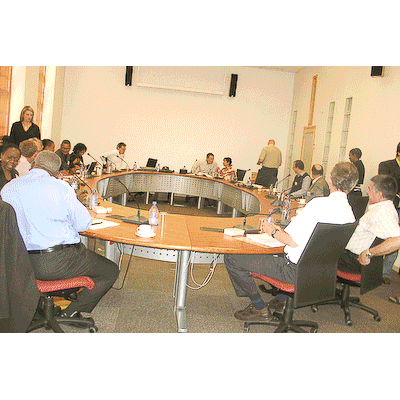Founding meeting of the Advisory Panel of the International Institute of Diversity
The University of the Free State (UFS) today (20 November 2008) successfully convened and hosted the founding meeting of the Advisory Panel of the International Institute of Diversity.
In the wake of the Reitz video incident, the UFS wishes to establish an institute that will study and promote transformation on the campus as a microcosm of the much broader socio-political challenges facing South Africa. It is hoped that in due course the UFS and the institution will develop the expertise and experience to help other organisations and societies in transition.
The institute will work closely with the Transformation Cluster – one of six strategic academic clusters already created as part of the university’s long-term strategic plans.
Given the transformation climate in which it finds itself, the university recognises that the guidance, support and direct involvement of thought leaders and other specialists in the field of transformation are critical to the design and operation of the proposed institute. To this end, the university has established an advisory panel for the institute. The Advisory Panel will give guidance to the Executive Director (to be appointed) in helping with the conceptualisation, design, and development of the institute, and the compilation of its business plan.
Brian Gibson Issue Management facilitated the meeting and is also responsible for the reporting on the meeting. The International Institute for Development and Ethics (IIDE) co-hosted and provided the secretarial support for the meeting.
 |
The members of the advisory panel:
(Click here to read more about the Panel Members)
External panel members:
Dr Clint Le Bruyns, Senior Lecturer in Public Theology and Ethics at the University of Stellenbosch .
Dr Sebiletso Mokone-Matabane, Chief Executive Officer, Sentech Limited.
Dr Andries Odendaal works in the field of conflict transformation with international agencies such as the United Nations, DANIDA and GTZ.
Prof. Lungisile Ntsebeza, National Research Foundation (NRF) Research Chair in Land Reform and Democracy in South Africa in the Department of Sociology, University of Cape Town.
Mr Roger Crawford, Executive Director for Government Affairs and Policy South Africa, Johnson & Johnson.
Prof. Jonathan Jansen, Dean of the Faculty of Education, University of Pretoria 2001 to 2007.
Ms Zandile Mbele, Director of Plessey (PTY) Ltd. and the Transformation Executive for Dimension Data.
Dr André Keet, Director: Transdisciplinary Programme at the University of Fort Hare in October 2008 and part-time Commissioner with the Commission for Gender Equality.
Dr Reitumetse Obakeng Mabokela is an associate professor in the Higher, Adult, and Lifelong Education Program in the Department of Educational Administration at Michigan State University.
Dr Mpilo Pearl Sithole is a senior research specialist in the Democracy and Governance Research Programme at the Human Science Research Council.
Professor Steven Friedman, D.Litt. is Director of the Centre for the Study of Democracy at Rhodes University and the University of Johannesburg.
Representatives from UFS:
Prof. Teuns Verschoor, Vice-Rector: Academic Operations at the University of the Free State, and currently Acting Rector and Vice-Chancellor.
Prof. Piet Erasmus, Interim Co-ordinator for the Cluster Transformation in Highly Diverse Societies.
Prof. Lucius Botes, Director of the Centre of Development Support and Programme Director of the Postgraduate Programme in Development Studies.
Prof. Philip Nel, Former Director of the Centre for Africa Studies at the UFS.